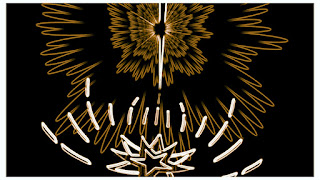Can unusual events happen by coincidence or by chance? Also, try to think of life with or without chances and opportunities. See the magic in the beauty of large numbers, abstract, inevitability, and probability.
 |
| A Spider star is a chance of a web of bursting brightness whose lights are opportunities from one probability and effect out of many. |
Chances and Probabilities
Rare events happen when probabilities are very small given a large number of choices and the opportunity to achieve one thing. The law of very large numbers: When your sample size is very large, “impossible” events are inevitable. Dobelli
Think of the times you tried as many times as you could to achieve something. Couldn't you do it many times sufficiently enough that you achieved it? Life goes on, provided that an opportunity is given abundant and enough chances to cause extraordinary coincidences and the likelihood of probable events.
Life is a large number of chances and outcomes. Life is a chance among many chances that one of which is an opportunity and likelihood of extraordinary achievement.
The Law of probability lever; tells us that if we slightly change the circumstances or beliefs we can highly change the likelihood.
Opportunities come in multiple chances. Each chance carries a probability of an outcome. Like a lottery game, we got a lot of chances to create an opportunity. The real opportunity depends on the number of trials carried out toward achieving the outcome.
Like a light ray with its rainbow colors, life Is an outcome that comes in many colors of the light that shines the opportunity from many chances. Finding the right opportunity is among the probability of the outcomes of events. Large numbers work magic and not magic works large numbers.
Still, to assume whether extraordinary events are unlikely, one ought to examine their odds in natural circumstances, and solely not believe in an invisible force, that drives similar events happening at the same time with magic.
An opportunity is a mystery solved by using multiple times of chances. Trying is the imagination of the outcome of each chance. In every outcome, there is a pre-state of achieving goals characterized by direct and random choices.
The usefulness of Near Enough and Probability as well as Coincidence
- Probability provides information about the likelihood that something will happen. Meteorologists, for example, use weather patterns to foresee the possibility of rain.
- Because we never find it significant when likely events occur, we spotlight unlikely events and notice them more.
- The Law of Inevitability says that something must happen. Probably, as an aftereffect of that law, we have Borel’s Law which says that "sufficiently unlikely events are impossible". This can help us to regulate large missions' top risks. In the process, we dismiss events that appear adequately unlikely.
- Coincidence as a perceived meaning is a personal meaning or Synchronicity. It is a concept developed by psychologist Carl Jung to explain a perceived meaningful coincidence. Jung described synchronicity as an "acausal connecting principle" in which events, both large and small, in the external world might range with the experience of the self, perhaps revealing or reproducing personal concerns or thoughts.
- Coincidence can be used to evaluate probability from the logical existence of the facts about the trend of human natural behavior.
- The inevitability of succeeding in life is characterized by having a large number of trials to the extent that achieving is logically real and possible.
Tossing a die rules the chances of an outcome. The opportunity of a probable outcome among multiple times of chances after tossing it. To realize what we desire in life is a work from an imaginary outcome to actual results manifesting from thinking and executing.
The nature of humans is being free structures beyond the balance of logic and meaning. The complexity of science in finding rare events explanations. This exists as an essential wish nowadays. Space and time, as well as changes in the physical world, have a cause for their effects through chances and randomness of expectation in choices.
At every chance, there's an effort of trying to find and use that opportunity to understand and achieve. We normalize the outcome with the knowledge or without knowing. Life gives an opportunity according to the chances available. We create options through opportunities as we formulate chances.
Achievement as an outcome works best for those who create opportunities, through a process of chances and random choices. The improbable outcome is a way of life. Probability is a set of chances in events vital for attaining goals in life.
Life as a product of nature is mysterious and it manifests in random chances of events, such that improbable events are commonplace.
References
Improbable probability. (2024). Imperial College London. https://www.imperial.ac.uk/be-inspired/magazine/issue-41/improbable-probability/
Johansen, M. K., & Osman, M. (2020). Coincidence judgment in causal reasoning: How coincidental is this? Cognitive Psychology, 120, 101290. https://doi.org/10.1016/j.cogpsych.2020.101290
Synchronicity: An Acausal Connecting Principle – International Association of Analytical Psychology – IAAP. (n.d.). https://iaap.org/jung-analytical-psychology/short-articles-on-analytical-psychology/synchronicity-an-acausal-connecting-principle/



Like your blog keep working
ReplyDeleteOutstanding article, Keep working
ReplyDeletegreat article. keep posting more
ReplyDeleteThis is best blog for genius
ReplyDeleteNice blog. It will be really helpful for me.
ReplyDelete